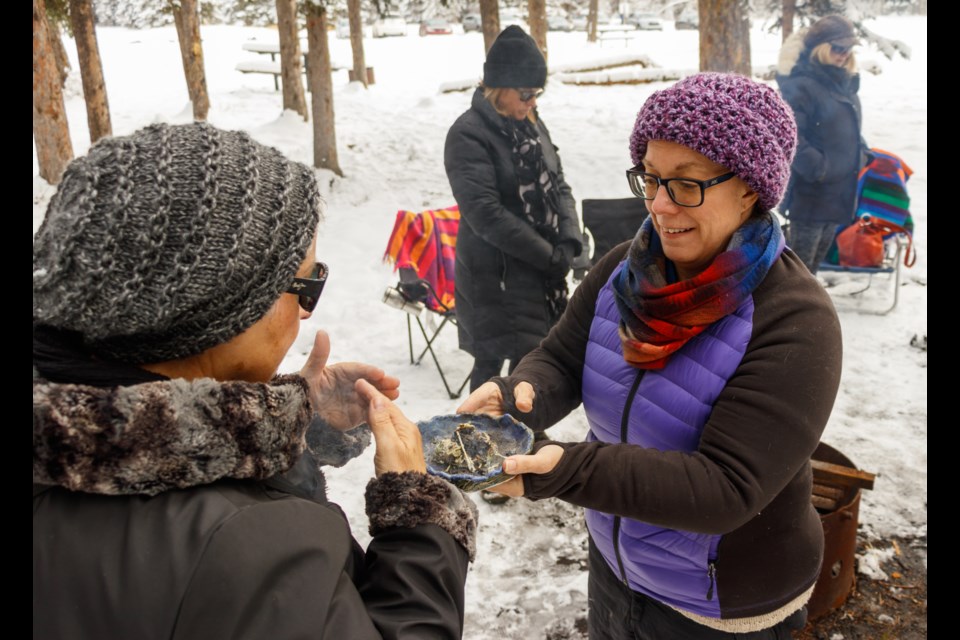Nestled in picturesque Bragg Creek Provincial Park, guests gathered for the National Swan Song Festival to begin the process of healing from loss and grief.
“It was quite healing,” said Julie Handrahan, an end-of-life doula who hosted the event. “Our hope, in all of this was, to create hope for people to move on and continue in this world.”
Oct. 17 was a day of meaningful conversations, tears and laughter, Handrahan said.
The ceremony was one of many that occurred across Canada during the National Swan Song Festival. The festival was meant to honour the experience of grief and loss. Locally, Handrahan and co-host Louise Piche created a sacred space to cleanse and encourage healing of the mind, body and spirit.
Guests were invited to write messages of loss in any way they chose and then throw the notes in a campfire. They could also participate in a smudge to help ease the negative feelings of loss.
Piche said guests were able to participate in the ceremony in any way they felt comfortable, whether sharing stories during blessings or quietly listening to others speak.
The ceremony offered a chance for guests to be vulnerable while sharing in the communal experience of loss, Handrahan said.
“With COVID, it’s brought on so many losses, whether it’s the loss of a loved one or losses in general, like losses of employment, losses of hope, of normalcy,” she said. “I saw relief when people would put their notes into the fire. I observed a sense of relief, a sense of letting go. That was really beautiful.”
This year has been an unprecedented and challenging time for many people, Handrahan said. People have no idea how long COVID-19 will impact communities or how long its associated losses will last. Handrahan said she hoped the National Swan Song Festival rituals and ceremonies empowered people and helped them find a sense of peace during the pandemic.
The ceremony sparked an interest in talking about the end of life, Piche said, and she hopes people continue the conversations to help normalize talking about death and loss.
The festival was an important learning opportunity, she added, because the conversations around the campfire allowed guests to chat about their experience with death.
“People are a little wide-eyed," Piche said. "Our goal here is to start the conversation and then all the good things can come from that."
More importantly, according to Handrahan, people learned the experience of loss was not their’s alone.
“Your grief might be different, but we’re all grieving,” she said. “You don’t feel alone.”
As end-of-life doulas, Piche and Handrahan share a common passion to help people feel better talking about end of life plans.
“We’re the advocate and we make to sure it's what the person who is dying wants – it’s their journey,” Piche said. “Sometimes when you’re dying there’s certain things you want but you don’t know how to ask your family for it. When it's someone who’s not family, it's really easy to say I would really like this.”
End-of-life doulas are “navigators” that can serve as a constant presence during someone's end of life journey, Handrahan said. They help families and those who are nearing the end of their life navigate the emotions and systems they encounter and serve as a sounding board and advocate when plans are being put in place.
Handrahan said the doulas learn the wishes of the dying person and communicate with family members and the health care system to ensure requests are honoured.
“We both believe that being an end-of-life doula is being a very individual experience," she said. "I might be good for somebody, or not, and Piche might be good for somebody, or not. Working together we can really provide a really good service depending on who we are working with.”
The duo are united by the core belief that nobody should die or navigate the end-of-life journey on their own, she said, and together they hope to grow and normalize talking about end-of-life care.
Events like the National Swan Song Festiva are pioneering conversations about death by providing the opportunity to have conversations that remove the taboo nature of the subject, she said.
The duo hopes to build on the experience and forge forward with more events in the community, including Death Over Dinners and Death Cafés.
“This is important,” Piche said.



